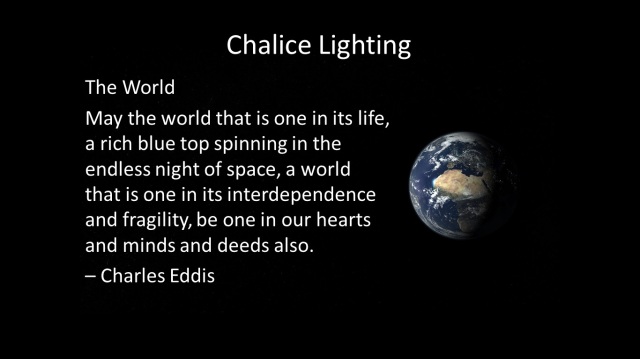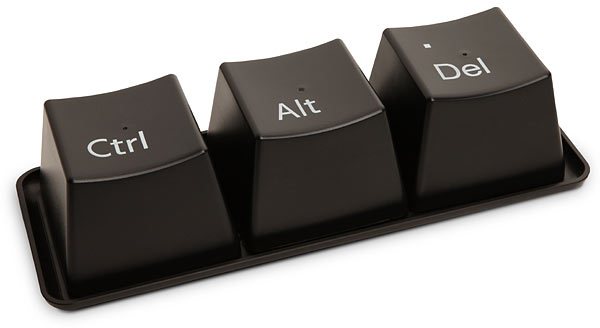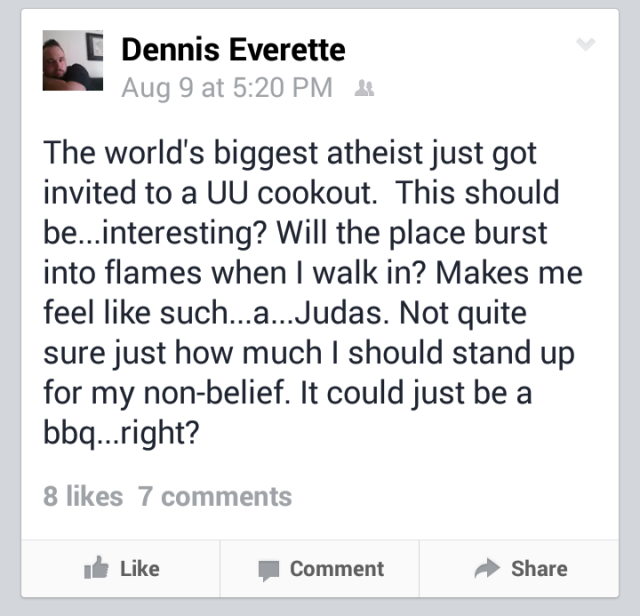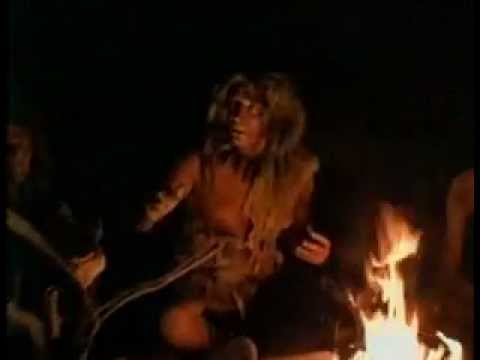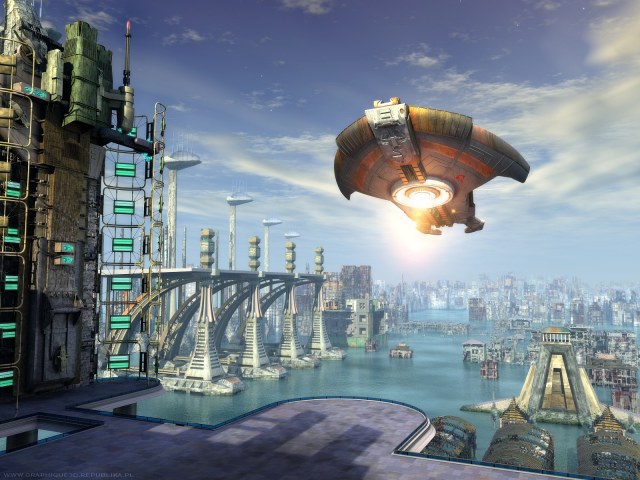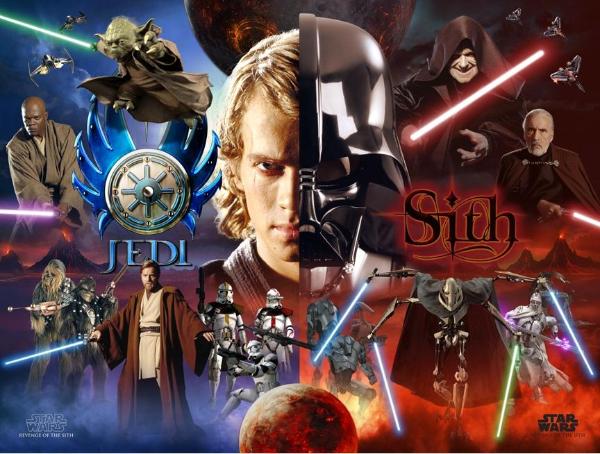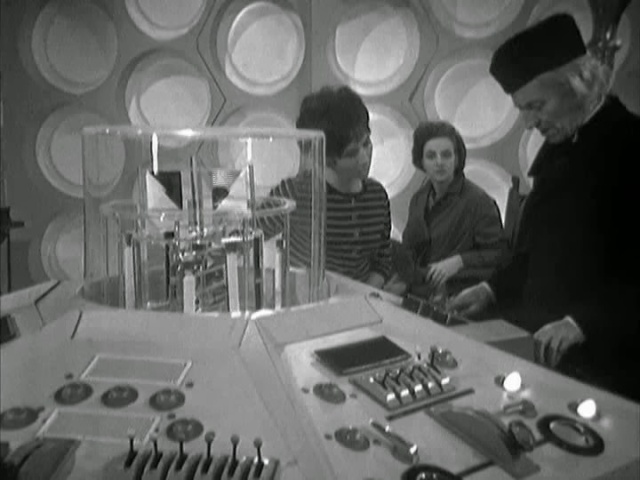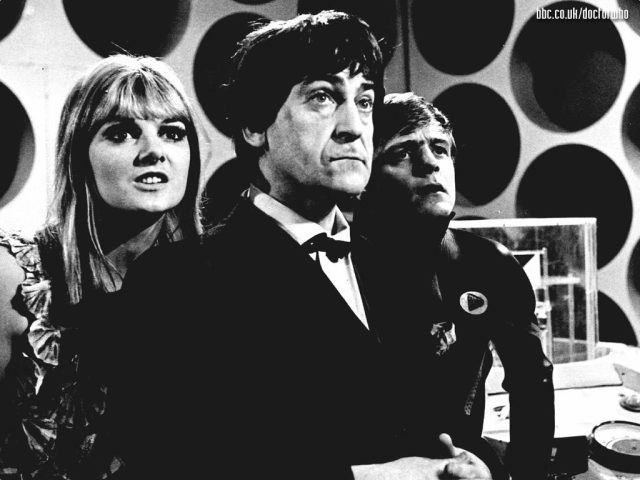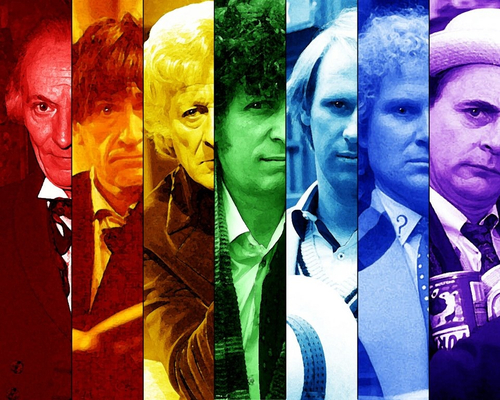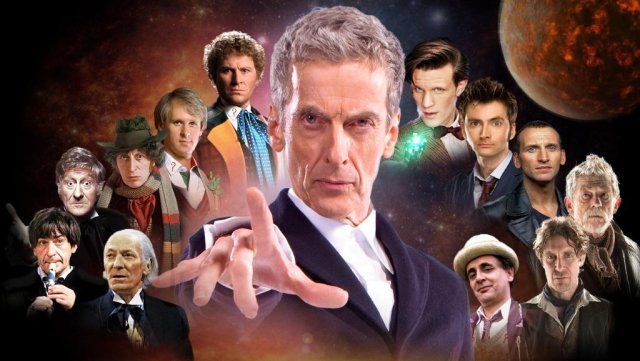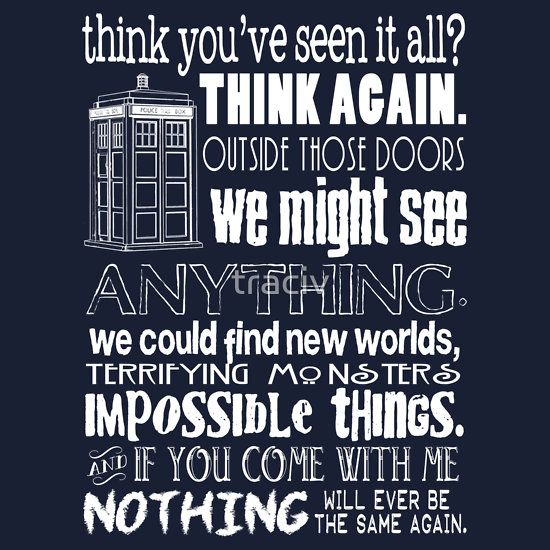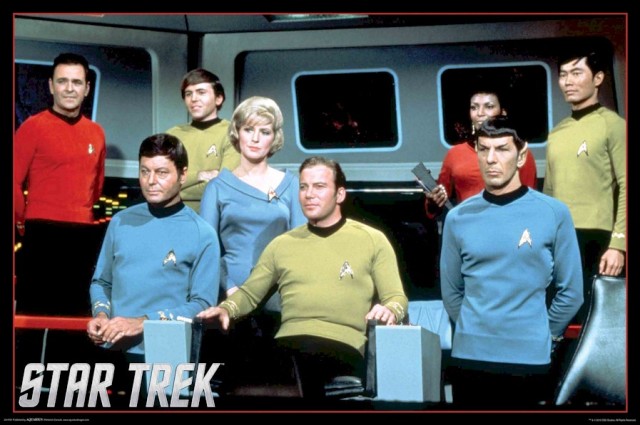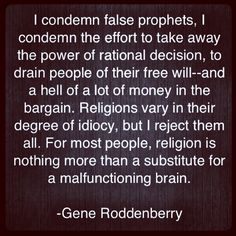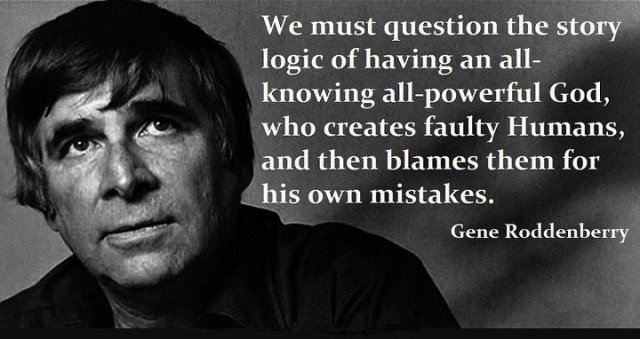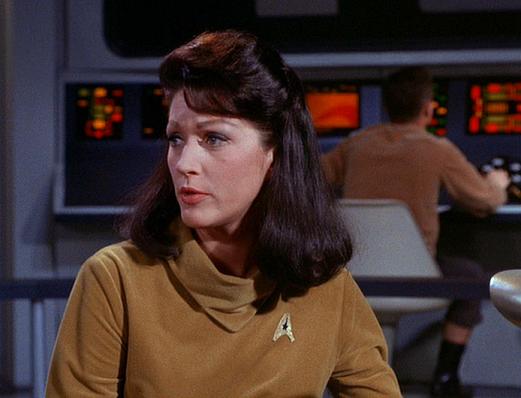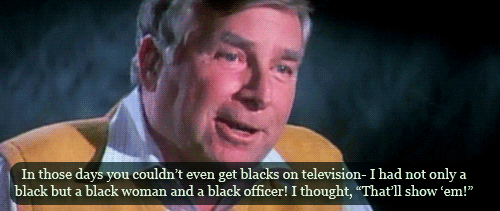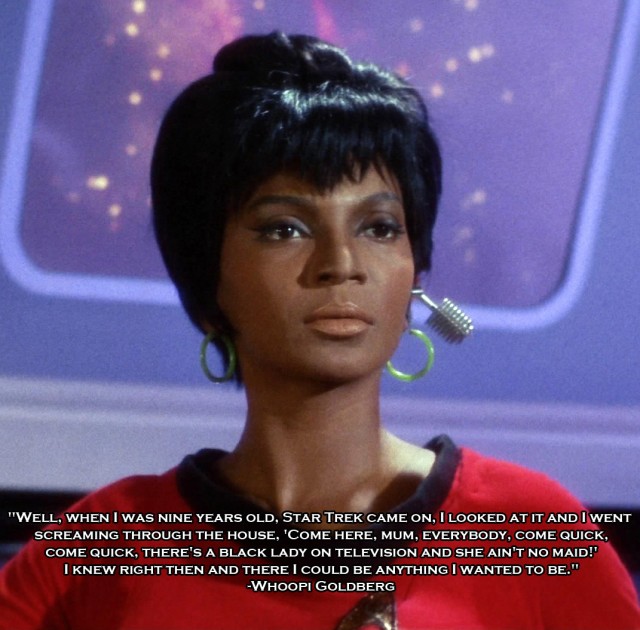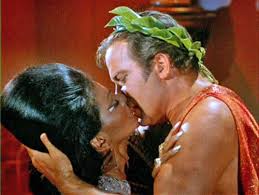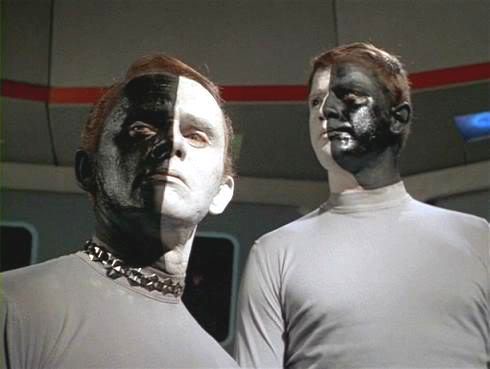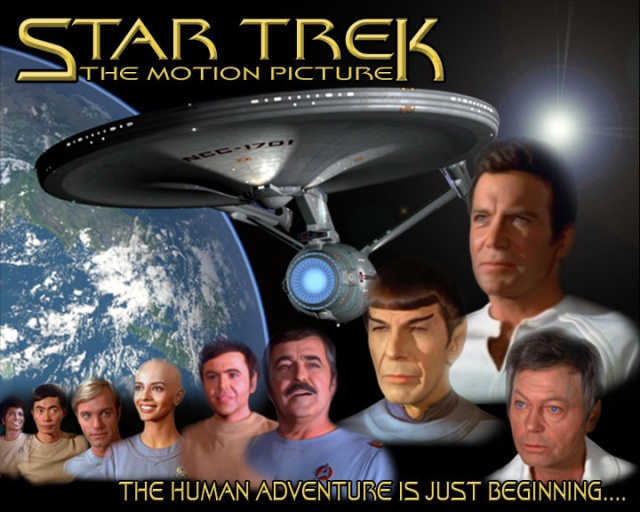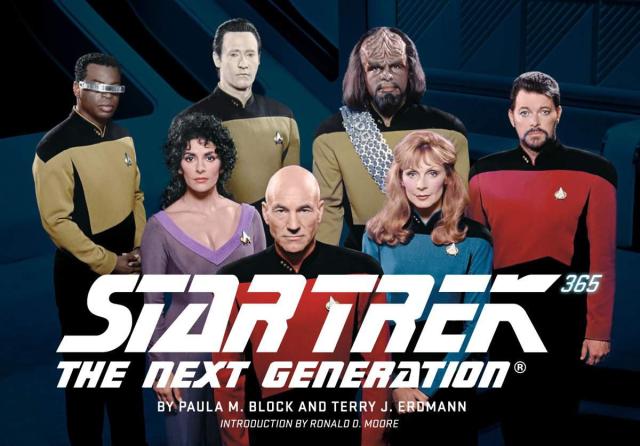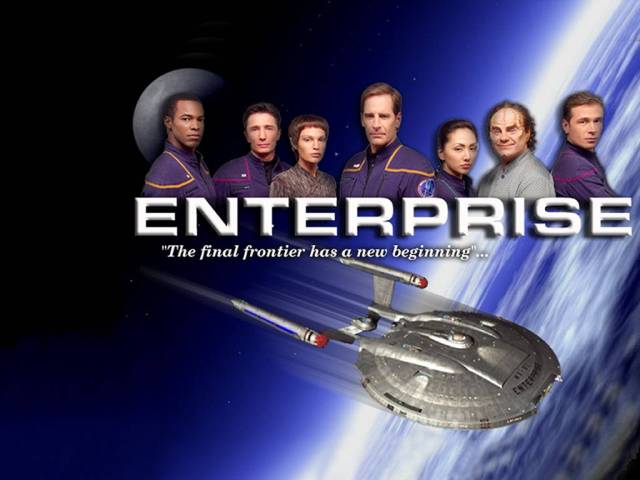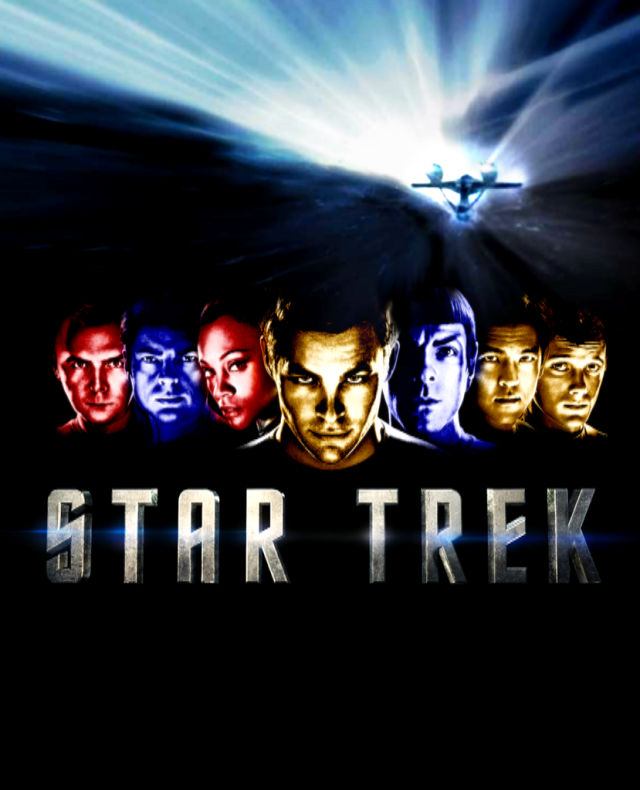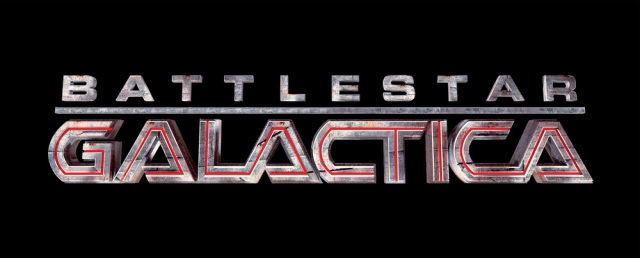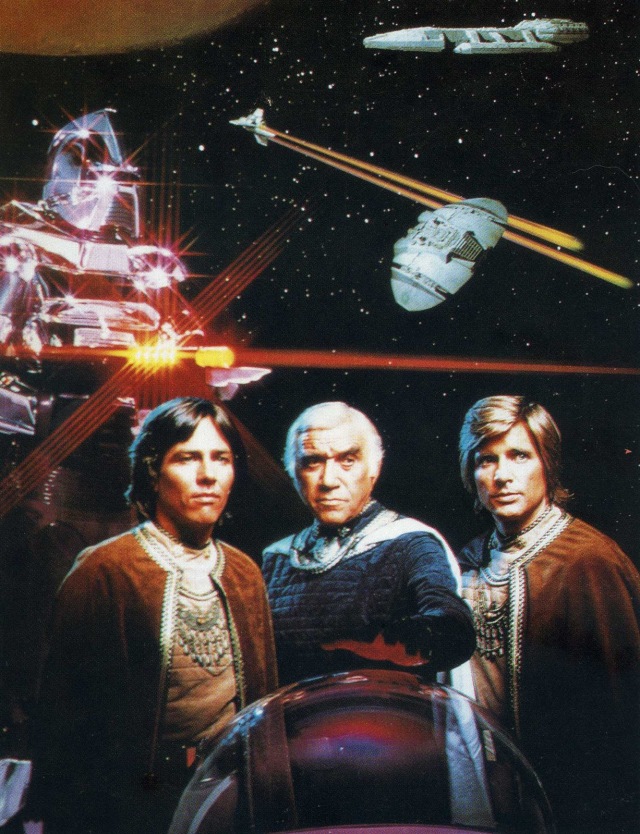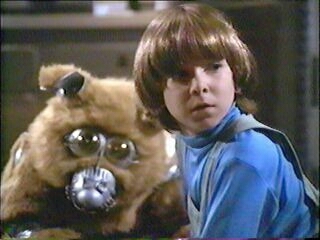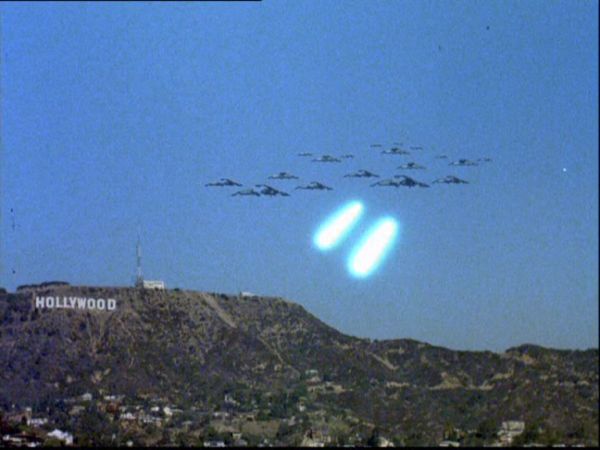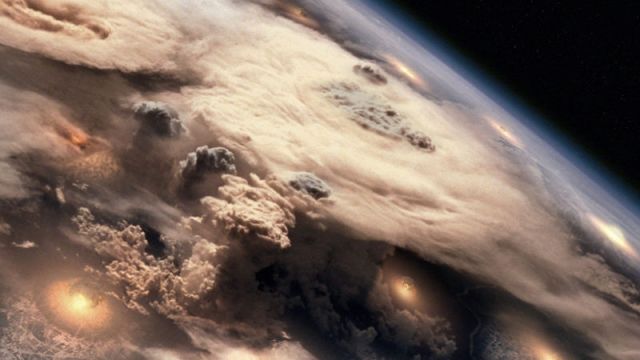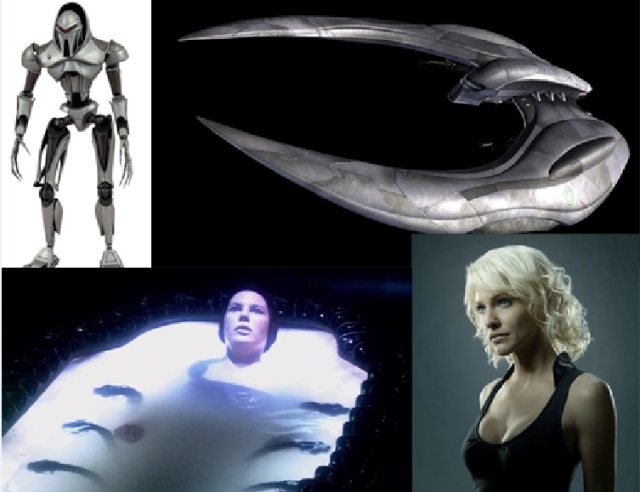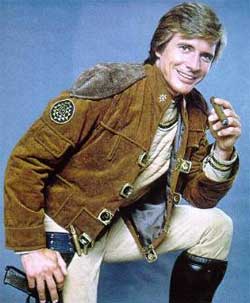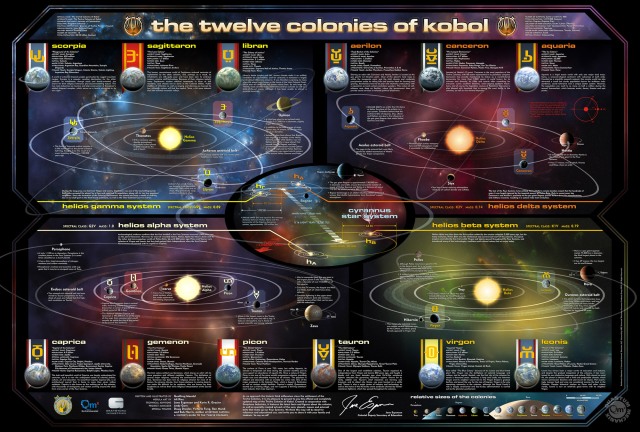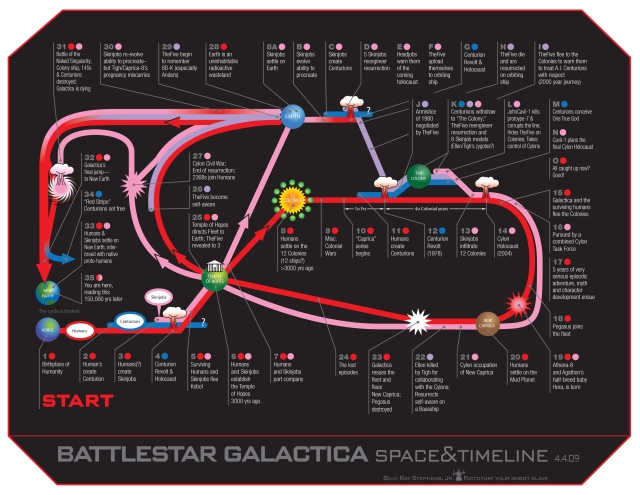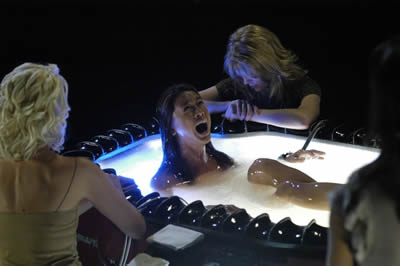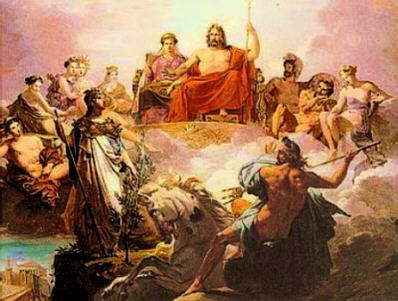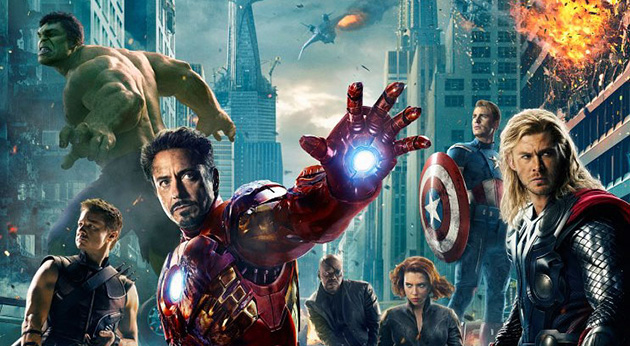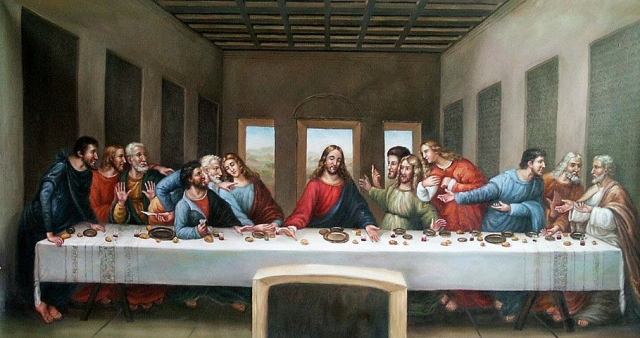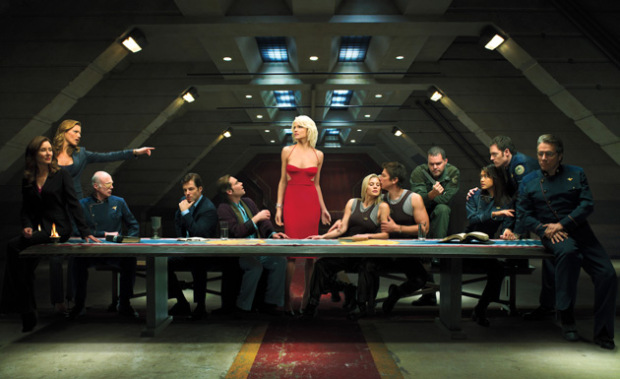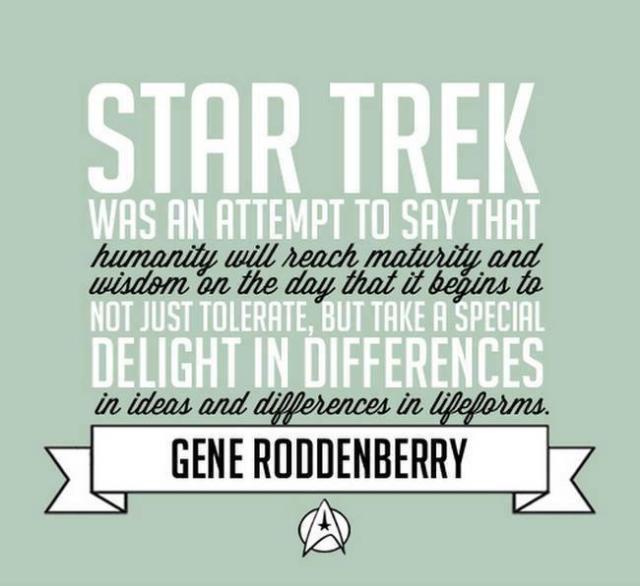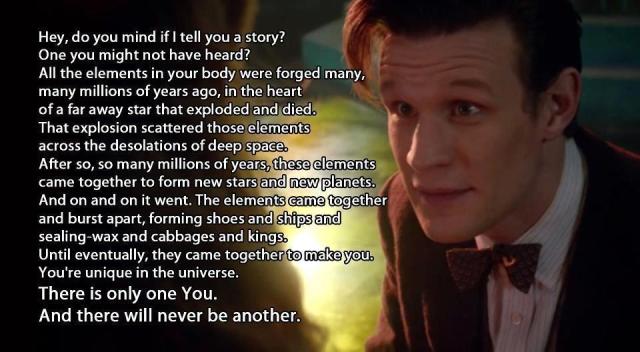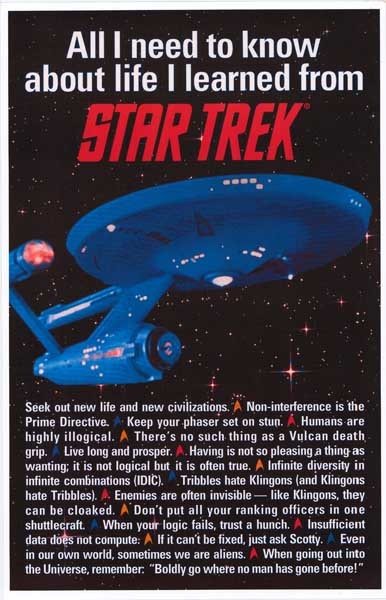This is the text and some images I used for my service at the UU Congregation of Greenville on “Science Fiction as Religious Literature” delivered in August 2014, posted by request.
Opening Words for the Lighting of the Chalice
Opening Words
Science is not only compatible with spirituality; it is a profound source of spirituality.
When we recognize our place in the immensity of light-years and in the passage of ages, when we grasp the intricacy, beauty, and subtlety of life, then that soaring feeling, that sense of elation and humility combined, is surely spiritual. So are our emotions in the presence of great art or music or literature, or acts of exemplary selfless courage such as those of Mohandas Gandhi or Martin Luther King Jr. The notion that science and spirituality are somehow mutually exclusive does a disservice to both.
Carl Sagan
Control-Alt-Delete
A friend of mine, originally from North Carolina, recently moved from Arizona to Indiana. Soon after arriving, he posted the following to his Facebook Page:
I, along with several other of his friends, assured him he would be perfectly safe, and would rather enjoy the experience. Not only are GLBT-identified individuals quite welcome, I also explained that he’d likely feel just as comfortable self-identifying as a Humanist. I went further by giving my own distinction to the differences between Atheists and Humanists.
- Deists believe in God, although they may have non-traditional views on the issue.
- Agnostics neither affirm nor deny the existence of a God.
- Atheists insist there is no God.
- Humanists are not particularly concerned with the issue, instead focusing on the betterment of Humanity.
While I personally do not believe in the existence of at least the Abrahamic concept of God, I tend to shy away from labeling myself as an Atheist.
I used to call myself Agnostic, but grew to a point where the term no longer fit. I tend to find little disagreement between myself and someone espousing Atheist beliefs, except for some of the absolutism of their arguments, and have even self-identified as Atheist on some surveys, where no better option, such as “Other” was provided.
Within that spectrum of belief, Humanist is certainly where I fit best, but I also enjoy a spiritual connectedness to nature, and find a fulfillment in some Pagan spirituality and ritual, but similarly don’t like to label myself as a Pagan either. I prefer the term “Pagan-adjacent” although there is a place for me on the Pagan spectrum of belief as well… Scientific Pantheist.
Pantheists believe in the concept of the Universe as Divinity, the source of creation, mystery, and wonder. Science is the spiritual study of that Divinity and its discoveries are the revelation of “God” revealing itself and its nature. Documentary shows such as “Cosmos” and “The Universe” are my version of Televangelism.
I think my greatest reluctance to embracing the label of Pagan isn’t any stigma involved with the term. While I have some spiritual practice in common with Pagans and fit within the spectrum, I feel a need to differentiate myself from the wide range of Pagan theology of associating with a particular pantheon or specific Deity, whether literally or only figuratively. I already rejected the God of Abraham, and have no desire to replace Him with another Him, a Her or a Them, even more anthropomorphized than the one I’d already disavowed. I’d have to say my first Christian heresy on my way to Humanism was the fact that I couldn’t accept that God (specifically Yahweh) would have a gender… wouldn’t that be a limitation? It was my first step toward the eventual conclusion that we’d created God in our image, rather than the other way around.
Humanist… Humans… Humans are storytellers. Stories are the method through which our cultures are passed from generation to generation. Originally, these were oral traditions… parents, other older extended family members, or maybe an elder, teacher, or priest telling their culture’s stories. Later after the development of writing, these stories were put down on paper or some other medium to be read. Some stories were acted out and became dances or plays. Today we have not only plays, but also movies, television, and digital media. For a Humanist, what are my stories? The stories which convey my modern Humanist values?
As a Religious Humanist, I can draw inspiration from the stories of various cultures and time periods, paying more attention to the values they convey rather than the religious language, but I want stories which speak to my values and the values I exalt in humanity. Where can I find stories that inspire me and other humans to our greatest potential, speaking to us about where we are and where we could be going?
For me, I find these stories in the genre of Science Fiction, and more particularly for me, more so in movies and television series than in books. The current state of visual effects technology far exceeds my own ability to visualize these stories from the written text of books.
Based on this preference, I’d like to call my beliefs by a more specific term than Humanist or Scientific Pantheist. I’d like to be known as a Religious Futurist.
Now, Science Fiction fans are not a rarity, and while only a small subset pursue it with a religious zeal, others may not realize how the stories may affect their worldview. Similar to Pagans, we do tend to have an affinity for a specific Pantheon or Pantheons, and then there are the eclectics, who choose to dabble in different traditions taking what speaks most to them. I like to think of myself as more eclectic, enjoying the stories of various potential futures, but I do have a few favorites.
Before I get into my examples of Science Fiction that inspires me, I do want to make a clarification in before you start to make an assumption.
Did you know that there are Jedi and Sith religions inspired by the Star Wars franchise? Both faiths espouse a belief in The Force, with its Light and Dark Sides, but have differing philosophies and worldviews on each side. No, I don’t want to adopt a faith from a fictional source… remember I already rejected that idea, but that time it was the Bible. NO, while I enjoy the Star Wars movies and the Jedi and Sith dualism reminds me a bit of Zoroastrianism, it is not among my top 3. What are my top 3? I’ll get to that soon.
Wait, what does all this have to with reboots? I thought you were going to talk about computers or something!
Well, while “reboot” originated as a computer term for restarting a computer, it also has application to Science Fiction. While new Sci-Fi series pop up constantly, some of the most popular, including all 3 of my favorites have gone through “reboots”, that being they were an old series that got cancelled due to bad ratings, but continued to have great popularity among their fans, often increasing with the passing of the series. Later on, someone has the idea to try to bring that series back, rebooting it, either as a later story taking place after the original, or taking the concept and reshaping it entirely. There are many examples of reboots with various levels of success, but in several cases, the new series has long outlasted its predecessor.
My first example, of my 3 favorites, is actually an exception to that last statement, being that the rebooted series hasn’t had enough time to do outlast the original. Doctor Who first premiered on the BBC on 23 November 1963. Envisioned as an educational program for children, it chronicled the adventures of a Time Traveling alien called “The Doctor”, part of a race called the “Time Lords”. He traveled through space and time with his granddaughter and two of her schoolteachers from Earth. The history teacher and science teacher were reflective of the concepts the show sought to explore through their travels. Through the human eyes of the Doctor’s Companions, we travel to the future and to the past, while keeping the story interesting.
As the show continued, as with any show, actors decide to move to different projects. For the Companions, writing them out of the show and replacing them with new Companions was no issue, but during the third season, it became increasingly evident that the veteran actor hired to play the Doctor was of ill health and was having a great deal of difficulty fulfilling his role. What to do? The companions can be changed easily, but you can’t get rid of the character who is the center of the show!
Writers decided upon a controversial, but ingenious solution. When Time Lords get old or are severely injured, their bodies “regenerate” and take on a brand new form. It is still the same Doctor, with all the same memories, but a new body and generally a very different personality as well. Insert new actor here.
Over its initial run from 1963 to 1989, seven different actors took the role of the Doctor for spans of 2 to 7 years. The longest run for a Doctor was that of the 4th, played by Tom Baker, who remains to this day many fans’ favorite. He was the first Doctor I ever saw, watching reruns of his 1974-81 episodes aired in the US on PBS stations. Episodes featuring the 5th Doctor (my favorite of the classic series) also aired similarly in the US, but eventually stopped. By 1989, poor ratings led to the cancellation of the series, but it continued to have many fans who continued their admiration of the series though repeats and new novels.
An early attempt to reboot the franchise resulted in a 1996 movie and an 8th actor to take the role, but a new television series did not materialize. A new series would not become reality until 2005, and continues to today. The 8th season of the revived series just premiered on August 23rd with Peter Capaldi starting his stint as the 12th Doctor. The revived series has had consistently high ratings not only in the UK, but around the world and spawned 3 spinoff series, although not all spinoffs aired in the US.
Doctor Who to me promotes a Unitarian philosophy, that Humans are inherently good. We have our flaws and limitations, but this 2000-year old Time Lord from the planet Gallifrey spends a lot of time visiting the Earth and traveling with companions who come from it, inspiring them to be even better.
The second of my favorite Sci-Fi series is probably one more familiar to a majority of you than the 1st or 3rd.
Star Trek premiered in 1966, chronicling the adventures of the crew of the Starship Enterprise, 300 years in the future. Despite only going 3 seasons before being cancelled, the characters of Kirk, Spock, McCoy, Scott, Sulu, Chekov, and Uhura project a multicultural Americanized ideal into the future and reflect it back to us. Religion itself plays little role in the series, a reflection of its creator Gene Roddenberry’s own disdain for religion.
“I condemn false prophets, I condemn the effort to take away the power of rational decision, to drain people of their free will – and a hell of a lot of money in the bargain. Religions vary in their degree of idiocy, but I reject them all. For most people, religion is nothing more than a substitute for a malfunctioning brain.” — Gene Roddenberry
Roddenberry’s rejection of all things religious is likely the rejection of his Southern Baptist upbringing. And I’m sure there are many among us who have a similar journey of coming to Unitarian Universalism in a rejection of our childhood faiths. He did self-identify as an atheist and as a humanist, but a secular humanist.
While Roddenberry rejected religion, I embrace it with Religious Humanism, because for Humans (and in this case other assorted alien species) to advance to the enlightened future portrayed, we require not only scientific advances of technology and politically progressive movement toward socio-economic equality (yes, Star Trek does tend toward many Socialist ideals, and I like it for that) but there needs to be a common ideal inspiring us to work together toward our greatest potential, something which educational indoctrination alone cannot accomplish.
Star Trek does explore themes of religion, but rarely those held by its protagonist characters. The theme generally comes up in the interactions with alien species, and are viewed as more primitive than those of Humans or Vulcans who have evolved beyond superstitions.
Star Trek of the 1960s was also limited from being as liberal as it might’ve liked by the decisions of producers afraid of being too forward thinking for television audiences of the day. The original pilot episode of Star Trek featured a female first officer, played by Majel Barrett, who instead played Nurse Chapel in the series. While not quite achieving equality of the sexes, the original series was groundbreaking in that it was first American series to portray Africans and Asians in a science fiction future.
It is also known for that first non-platonic interracial kiss between Captain Kirk and Lieutenant Uhura, but able to dismiss its significance at the time as the characters were being telekinetically controlled at the time.
The show more indirectly addressed issues of racism in an episode where the crew encounter a planet inhabited by beings who are white on one side and black on the other, their world nearly destroyed by a war between those whose color combination left vs right are opposite to their enemies, a distinction which is not evident to the crew at first.
But back to the idea of reboots, I think Star Trek has probably had more than any other popular Science Fiction franchise. After 3 seasons of it’s 5 Year Mission, Star Trek (TOS) was cancelled, but lived on in syndication garnering greater and greater audiences. Work on a feature film began in 1975, but was scrapped in favor of a new television series to have been called “Star Trek: Phase 2” featuring the original cast. Producers later changed their minds again due to the success of Star Wars and Close Encounters of the Third Kind, adapting the story back to a movie which would become
“Star Trek: The Motion Picture” released in 1979. This and 5 further films continued the adventures of the same original crew through 1991.
In 1987, with the continued success of the Star Trek films, Gene Roddenberry teamed up with Paramount Pictures to produce a new television series, taking place 100 years in the future from the original series with a new cast, following in the footsteps of the original in a new Starship Enterprise (in that timeline, the 8th to carry that name, dating back to the United States prototype Space Shuttle which was named in honor of the series). New characters with different personalities and approaches brought new fans to the franchise, a continuation of the journey started by the original series, now led by Captain Picard, Commander Riker, android Commander Data, Dr. Crusher, Counselor Troi, and Klingon Lt. Worf among others.
Star Trek TNG went on for 7 seasons, inspired 2 spinoff series (Star Trek: Deep Space 9 and Voyager) and 4 movies, the first of which, Generations, served as a hand-off, featuring cast members from both Original Series and Next Generation crews.
The last Star Trek series took a different direction than its Next Generation predecessors. Rather than journeying further into the future, Star Trek: Enterprise was a prequel, telling a story of a prior Enterprise crew, this time just over 100 years prior to Captain Kirk’s 5 year mission, and thereby closer to our own current time than to that of Picard and the Next Generation. In all honesty, this was my favorite of the television series, humans still learning their way in the galaxy, much less confident about how things will turn out and with less reliable technology. The series lasted 4 seasons 2001-2005, and was the first Star Trek series to be produced in HD.
The final Next Generation movie, Nemesis, had released in 2002. Where could Star Trek go from here? We’ve had sequels, spinoffs, and a prequel, now it’s time for the most drastic type of reboot: a reimagining!
The 2009 film simply entitled “Star Trek” uses time travel as a premise to give the original series’ characters a new telling. A Romulan who inadvertently travels to the past in pursuit of a future Ambassador Spock ends up arriving and changing the history of James T Kirk, and later destroys the planet Vulcan, homeworld of Spock in revenge, thereby creating a new distinct timeline from the original series, and one within which both an old Spock from the original timeline, as well as a young Spock from the new timeline, exist simultaneously, but under new circumstances with entirely new possibilities unencumbered by the “cannon” of any other Star Trek series, movie, or book that takes place after the timelines diverge. (Meaning they are stuck only with adhering to the history of the prequel series Enterprise.)
Oh, and not to mention that in this new reality, Spock and Uhura are romantically involved, so they can kiss without having to blame it on mind-control.
The 2013 follow-up Star Trek Into Darkness then follows up with a totally new take on the character of the ominous Khan Noonian Singh, a character introduced in The Original Series and revisited in Star Trek II, The Wrath of Khan.
As my last example of Science Fiction that inspires me, may I present Battlestar Galactica.
Battlestar Galactica was a show which originally premiered in 1978. I was 7, but I used to watch it with my mother, who was a big fan of the show. I remember dogfights in space between Colonial pilots and their adversaries, the Cylons, but what stood out more was a boy character, about the same age as me, and his robot dog.
It was the story of the survivors of the 12 Colonies of Mankind, in a caravan of just over 200 civilian spaceships, led by one military vessel to protect them, the Battlestar Galactica. The colonies had been in a 1000-year long war against the cybernetic race of the Cylons, who had finally prevailed in a sneak attack made under the guise of peace. The ships set off in search of a legendary 13th Colony, known as Earth, enduring attacks from the Cylons along their route.
The series only lasted one season before being cancelled, then was brought back a year later, with a new series Galactica 1980, where the fleet finds the Earth, but it is much less technologically advanced than the Colonials expected, and the culture-clash is a major portion of the story line, as well as the continued threat of the Cylons, against whom the Earth humans have little defense. This series again, lasted only one season before being cancelled.
The series got another chance with a reboot in 2004, and like the 2009 Star Trek reboot, the new series was a reimagining, but to an even greater degree. The general premise of the surviving Colonial refugees in search of the legend of Earth after a surprise attack of the Cylons remains the same, but unlike the original, where the Cylons were the creation of a reptilian race, the reimagined Cylons were the creation of humankind, robots who were made intelligent and self-aware, but servants of humankind. Eventually, they rebelled, and war ensued, but only lasting 12 years before the Cylons unexpectedly agree to an armistice which lasts for 40 years.
This is where the new series begins, in the lead-up to a surprise nuclear bombardment of the 12 colonies (each colony is a planet) by the Cylons, but they have changed. Not only are there heavy-duty chrome plated battle Cylons (Centurions), but there are also Cylons who look identical to humans.
We also have many of the same characters as the original series, sometimes playing the same role, and sometimes a character with the same name may play a new role. My mom hated it.
She freely admits she couldn’t get over the fact that they made Starbuck (a fighter pilot and one of the major characters) a woman.
I wasn’t impressed at first, but really grew to appreciate the depth of the stories and how much the culture, politics, and religion played an important role in the storyline.
Yes, religion plays an important role in the reimagined Battlestar Galactica. In the original series, the Mormon religion of the series’ creator Glen Larson showed through in more subtle ways, including the analogy between the 12 colonies and the 12 tribes of Israel, along with a distant 13th tribe. The original series’ Cylons had no known religion. In the reimagined series, the prominent religion of the humans was a polytheistic one, in reverence to the “Lords of Kobol” (the planet from which all the humans originated) and these gods and goddesses share the names and roles of the Greek pantheon.
A cyclical nature of time is a common theme in their religion.
“All this has happened before and will happen again” is a core belief with stories from their ancient writings replaying themselves, and characters not having the control of their own destiny to the degree which they believe they do.
The reimagined Cylons, both humanoid and robotic models, also have a religion, a belief in “The One” a singular all-knowing and all-powerful God, although not their creator. The clash of philosophies plays a strong role. The absolutist monotheists carrying out what they believe to be the will of their God, confident in the knowledge that when they die, their consciousness gets downloaded to a resurrection ship, and by their technology, they are reborn into a new identical body.
This struggle between polytheist humans with relativist philosophical values and the absolutist, fundamentalist, monotheist enemy was also a big selling point among many Pagan Sci-Fi enthusiasts, who could even more strongly identify with the struggle of the Pagan protagonists being oppressed by the followers of the “One True God.”
I won’t go much further and spoil the surprises that this series, in its 4 seasons, several made-for-TV movies, and a prequel series Caprica which explores the origin of the Cylons, goes on to make. But if you’re interested in deeply exploring ideas of what it is to be human, this is a must-watch, even if you aren’t Pagan-identified. And it is one which can spur deep thoughts and great conversations on the issues it brings up. They do find Earth, but it isn’t 1980.
Through these stories, I explore the human condition, our limitations and our potentials, both of which come out in the extreme situations the stories portray. They make me think about issues, often ones which can be applied to current events issues. While this is not unique to Sci-Fi, I prefer contemplating the issues in a potential future scenario over stories of the past. We choose our Pantheons, our heroes, our stories.
This may be the the Gods of Olympus or Norse Gods
This may be the Marvel Avengers
This may be the 12 Apostles
Or It can be something a little different.
Find your inspiration where you are most inspired.
Closing Words from the 11th Doctor:

